高一英语下册第二周周练试题
高一英语下学期第二次周练试题_03
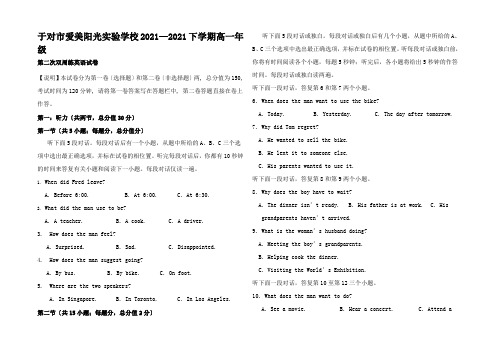
于对市爱美阳光实验学校2021—2021下学期高一年级第二次双周练英语试卷【说明】本试卷分为第一卷〔选择题〕和第二卷〔非选择题〕两, 总分值为150, 考试时间为120分钟, 请将第一卷答案写在答题栏中, 第二卷答题直接在卷上作答。
第一:听力〔共两节,总分值30分〕第一节〔共5小题;每题分,总分值分〕听下面5段对话。
每段对话后有一个小题,从题中所给的A、B、C三个选项中选出最正确选项,并标在试卷的相位置。
听完每段对话后,你都有10秒钟的时间来答复有关小题和阅读下一小题。
每段对话仅读一遍。
1.When did Fred leave?A. Before 6:00.B. At 6:00.C. At 6:30.2.What did the man use to be?A. A teacher.B. A cook.C. A driver.3. How does the man feel?A. Surprised.B. Sad.C. Disappointed.4. How does the man suggest going?A. By bus.B. By bike.C. On foot.5. Where are the two speakers?A. In Singapore.B. In Toronto.C. In Los Angeles.第二节〔共15小题;每题分,总分值2分〕听下面5段对话或独白。
每段对话或独白后有几个小题,从题中所给的A、B、C三个选项中选出最正确选项,并标在试卷的相位置。
听每段对话或独白前,你将有时间阅读各个小题,每题5秒钟;听完后,各小题将给出5秒钟的作答时间。
每段对话或独白读两遍。
听下面一段对话,答复第6和第7两个小题。
6. When does the man want to use the bike?A. Today.B. Yesterday.C. The day after tomorrow.7. Why did Tom regret?A. He wanted to sell the bike.B. He lent it to someone else.C. His parents wanted to use it.听下面一段对话,答复第8和第9两个小题。
高一英语下学期第周周练试题_02
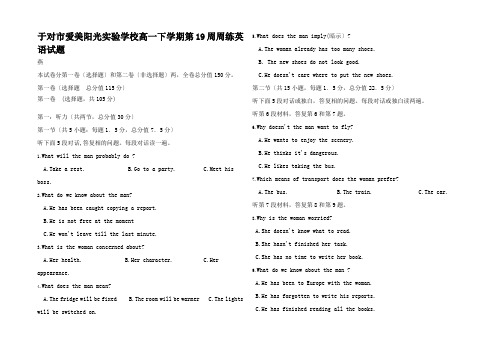
于对市爱美阳光实验学校高一下学期第19周周练英语试题燕本试卷分第一卷〔选择题〕和第二卷〔非选择题〕两,全卷总分值150分。
第一卷〔选择题总分值115分〕第一卷(选择题,共105分)第一:听力〔共两节,总分值30分〕第一节〔共5小题:每题1.5分,总分值7.5分〕听下面5段对话,答复相的问题。
每段对话读一遍。
1.What will the man probably do ?A.Take a rest.B.Go to a party.C.Meet his boss.2.What do we know about the man?A.He has been caught copying a report.B.He is not free at the momentC.He won't leave till the last minute.3.What is the woman concerned about?A.Her health.B.Her character.C.Her appearance.4.What does the man mean?A.The fridge will be fixedB.The room will be warmerC.The lights will be switched on.5.What does the man imply(暗示〕?A.The woman already has too many shoes.B. The new shoes do not look good.C.He doesn't care where to put the new shoes.第二节〔共15小题,每题1.5分,总分值22.5分〕听下面5段对话或独白,答复相的问题。
每段对话或独白读两遍。
听第6段材料,答复第6和第7题。
6.Why doesn't the man want to fly?A.He wants to enjoy the scenery.B.He thinks it's dangerous.C.He likes taking the bus.7.Which means of transport does the woman prefer?A.The bus.B.The train.C.The car.听第7段材料,答复第8和第9题。
2019-2020年高一下学期周测2英语试题 附详细解析
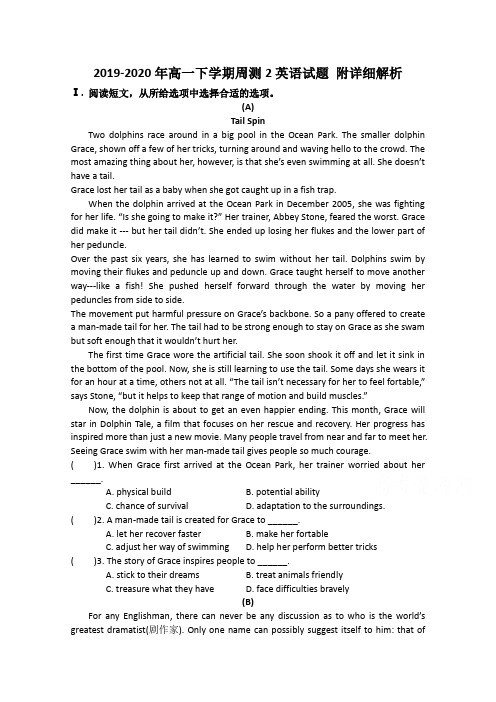
2019-2020年高一下学期周测2英语试题附详细解析Ⅰ. 阅读短文,从所给选项中选择合适的选项。
(A)Tail SpinTwo dolphins race around in a big pool in the Ocean Park. The smaller dolphin Grace, shown off a few of her tricks, turning around and waving hello to the crowd. The most amazing thing abo ut her, however, is that she’s even swimming at all. She doesn’t have a tail.Grace lost her tail as a baby when she got caught up in a fish trap.When the dolphin arrived at the Ocean Park in December 2005, she was fighting for her life. “Is she going to make it?” Her trainer, Abbey Stone, feared the worst. Grace did make it --- but her tail didn’t. She ended up losing her flukes and the lower part of her peduncle.Over the past six years, she has learned to swim without her tail. Dolphins swim by moving their flukes and peduncle up and down. Grace taught herself to move another way---like a fish! She pushed herself forward through the water by moving her peduncles from side to side.The movement put harmful pressure on Grace’s backbone. So a pany offered t o create a man-made tail for her. The tail had to be strong enough to stay on Grace as she swam but soft enough that it wouldn’t hurt her.The first time Grace wore the artificial tail. She soon shook it off and let it sink in the bottom of the pool. Now, she is still learning to use the tail. Some days she wears it for an hour at a time, others not at all. “The tail isn’t necessary for her t o feel fortable,”says Stone, “but it helps to keep that range of motion and build muscles.”Now, the dolphin is about to get an even happier ending. This month, Grace will star in Dolphin Tale, a film that focuses on her rescue and recovery. Her progress has inspired more than just a new movie. Many people travel from near and far to meet her. Seeing Grace swim with her man-made tail gives people so much courage.( )1. When Grace first arrived at the Ocean Park, her trainer worried about her ______.A. physical buildB. potential abilityC. chance of survivalD. adaptation to the surroundings.( )2. A man-made tail is created for Grace to ______.A. let her recover fasterB. make her fortableC. adjust her way of swimmingD. help her perform better tricks( )3. The story of Grace inspires people to ______.A. stick to their dreamsB. treat animals friendlyC. treasure what they haveD. face difficulties bravely(B)For any Englishman, there can never be any discussion as to who is the world’s greatest dramatist(剧作家). Only one name can possibly suggest itself to him: that ofWilliam Shakespeare Every Englishman has some knowledge, however slight, of the work of our greatest writer. All of US use words, phrases and quotations from Shakespeare’s writings that have bee part of the mon property of the English-speaking people. Most of the time we are probably unaware of the source of the words we used, rather like the old lady who was taken to see a performance of Hamlet and plained that it was full of well—known proverbs and quotations.Shakespeare, more perhaps than any other writer, makes full use of the great resources of the English language. Most of US use about five thousand words in our normal use of English; Shakespeare in his works used about twenty-five thousand.There is probably no better way for a foreigner to appreciate the richness and variety of the English language than by studying the various ways in which Shakespeare used it. Such a study is well worth the effort(it is not, of course, remended to beginners) even though some aspects of English usage, and the meaning of many words, have changed since Shakespeare’s day.( )4. English people ______A. have never discussed who is the world’s greatest dramatistB. never discuss any issue concerning the world’s greatest dramatistC. are sure who is the world’s greatest dramatistD. do n ot care who is the world’s greatest poet and dramatist( )5. Every Englishman knows ______A. more or less about ShakespeareB. Shakespeare, but only slightlyC. all Shakespeare’s writingsD. only the name of the greatest English writer( )6. Which of the following is true?A. We use all the words, phrases and quotations from Shakespeare’s writings.B. Shakespeare’s writings have bee the property of those who are learning to speak English.C. It is likely to be true that people often do not know the origins of the words they use.D. All the words people use are taken from the writings of Shakespeare.( )7. What does the word “proverb” mean?A. Familiar sayings.B. Shakespeare’s playsC. plaints.D. Actors and actresses.(C)Everywhere man is altering the balance of nature. He is facilitating the spread of plants and animals into new regions, sometimes deliberately, sometimes unconsciously.He is covering huge areas with new kinds of plants, or with houses, factories, slag-heaps and other products of his civilization.He exterminates some species on a large scale, but favors the multiplication of others. In brief, he has done more in five thousand years to alter the biological aspect of the planet than has nature in five million.Many of these changes which he has brought about have had unforeseenconsequences. Who would have thought that the throwing away of a piece of Canadian waterweed would have caused half the waterways of Britain to be blocked for a decade, or that the provision of pot cacti for lonely settlers’ wives would have led to Eastern Australian being overrun with forests of Prickly Pear? Who would have prophesied that the cutting down of forests on the Adriatic coasts, or in parts of Central Africa, could have reduced the land to a semi desert, with the very soil washed away from the bare rock? Who would have thought that improved munications would have changed history by the spreading of disease-sleeping sickness into East Africa, measles into Oceania, very possibly malaria into ancient Greece?These are spectacular examples; but examples on a smaller scale are everywhere to be found. We make a nature sanctuary for rare birds, prescribing absolute security for all species; and we may find that some mon and hardy kind of bird multiplies beyond measure and ousts the rare kinds in which we were particularly interested. We see, owing to some little change brought about by civilization, the starling spread over the English country-side in hordes. We improve the yielding capacities of our cattle; and find that now they exhaust the pastures which sufficed for less exigent stock. ( )8. The following examples except _____ reflect man altering the balance of nature.A. man is covering huge areas with new kinds of plantsB. man is facilitating the spread of animals into new regions.C. man is killing some species on a large scaleD. man is getting to know the importance of keeping the balance of nature. ( )9. What had a piece of Canadian waterweed cause?A. Eastern Australian was overrun with forests.B. Half the waterways of Britain blocked for a decade.C. In parts of central Africa, the land reduced to a semi desert.D. Disease-sleeping has been caused.( )10. What have spread diseases?A. Disease-sleeping sickness.B. Measles.C. Improved munications.D. Malaria.( )11. We make a nature sanctuary for rare birds but _______________.A. some mon and hardy kind of bird multipliesB. rare kinds multiplyC. all bird multiplyD. no bird multiply( )12. The main idea of the passage is ______________.A. that man is deliberately destroying the balance of natureB. that man has foreseen the consequences of altering the balance old natureC. that improved munications have changed historyD. that man is altering the balance of natureⅡ. 根据短文内容,从短文后的选项中选出能填入空白处的最佳选项。
高一英语 下学期 第2周周末练习
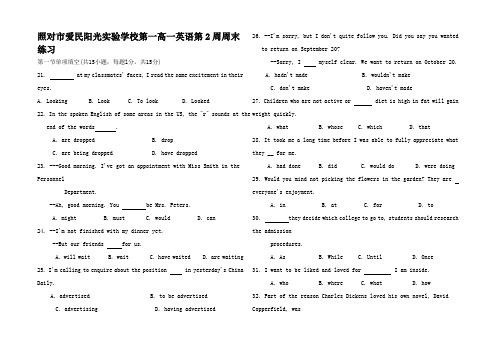
照对市爱民阳光实验学校第一高一英语第2周周末练习第一节单项填空(共15小题;每题l 分,共15分)21. at my classmates' faces, I read the same excitement in their eyes.A. LookingB. LookC. To lookD. Looked22. In the spoken English of some areas in the US, the "r" sounds at the end of the words .A. are droppedB. dropC. are being droppedD. have dropped23. ---Good morning. I've got an appointment with Miss Smith in the PersonnelDepartment.--Ah, good morning. You be Mrs. Peters.A. mightB. mustC. wouldD. can 24. --I'm not finished with my dinner yet. --But our friends for us.A. will waitB. waitC. have waitedD. are waiting25. I'm calling to enquire about the position in yesterday's China Daily.A. advertisedB. to be advertisedC. advertisingD. having advertised26. --I'm sorry, but I don't quite follow you. Did you say you wanted to return on September 20?--Sorry, I myself clear. We want to return on October 20.A. hadn't madeB. wouldn't makeC. don't makeD. haven't made27. Children who are not active or diet is high in fat will gainweight quickly.A. whatB. whoseC. whichD. that28. It took me a long time before I was able to fully appreciate what they __ for me.A. had doneB. didC. would doD. were doing 29. Would you mind not picking the flowers in the garden? They are everyone's enjoyment.A. inB. atC. forD. to30. they decide which college to go to, students should research the admission procedures.A. AsB. WhileC. UntilD. Once31. I want to be liked and loved for I am inside. A. who B. where C. what D. how32. Part of the reason Charles Dickens loved his own novel, David Copperfield, was__ it was rather closely modeled on his own life.A. whatB. thatC. whyD. whether33. some people regard as a drawback is seen as a plus by manyothers.A. WhetherB. WhatC. ThatD. How34. --The weather has been very hot and dry.--Yes. If it had rained even a drop, things would be much better now!And my vegetables ____.A. wouldn't dieB. didn't dieC. hadn't diedD. wouldn't have died35. First impressions are the most lasting. After all, you never get second chance to make __ make ______first impression.A. a; theB. the; theC. a; aD. the; a第二节完形填空(共20小题;每题l分,共20分)I met Mrs. Neidl in the ninth grade on a stage-design team fora play and she was one of the directors. Almost instantly I loved her.She had an Unpleasant voice and a direct way of speaking, 36 she wasencouraging and inspiring. For some reason, she was impressed with mywork and me.Mrs. Neidl would ask me for my 37 . She wanted to know how Ithought we should 38 things. At first I had no idea how to answerbecause I knew 39 about stage design! But I slowly began to respond to her 40 . It was cause and effect: She believed I had opinions, soI began to 41 them. She trusted me to complete things, so I completed them perfectly. She loved how 42 I was, so I began to show up to paint more and more. She believed in me, so I began to believe in myself.Mrs. Neidl's 43 that year was, "Try it. We can always paint over it 44 !"I began to take 45 . I had been so afraid of failing but suddenly there was no failing--only things to be 46 upon. I learned to dip my brush into the paint and 47 create something.The shy, quiet freshman achieved success that year. I was 48 in the programas "Student Art Assistant" because of the time and effort I'd put in.It was that year that I 49 I wanted to spend the rest of my life doing stage design.Being on that stage-design team 50 Mrs. Neidl changed me completely. Not only was I stronger and more competent than I had thought, but I also 51 a strong interest and a world I hadn't known existed. She taught me not to 52 what people think I should do: She taught me to take chances and not be 53 . Mrs. Neidl was my comforter when I was upset. Her 54 in me has inspired me to do things that I never imagined 55 .36. A. and B. yet C. so D. for37. A. opinion B. impression C. information D. intention38. A. make B. keep C. handle D. change39. A. anything B. something C. everything D. nothing40. A. questions B. comments C. explanations D. remarks41. A. hold B. follow C. evaluate D. form42. A. happy B. lively C. reliable D. punctual43. A. message B. motto C. saying D. suggestion44. A. again B. more C. instead D. later45. A. steps B. control C. charge D. risks46. A. improved B. acted C. looked D. reflected47. A. easily B. carefully C. confidently D. proudly48. A. introduced B. recognized C. identified D. considered49. A. confirmed B. decided C. realized D. acknowledged50. A. with B. below C. of D. by51. A. developed B. discovered C. took D. fostered52. A. accept B. care C. judge D. wonder53. A. bored B. lazy C. sad D. afraid54. A. trust B. patience C. curiosity Do interest55. A. accessible B. enjoyable C. possible D. favorable第三:阅读理解(共两节,40分)AGoldie's SecretShe turned up at the doorstep of my house in Cornwall. No way could I have sent her away. No way, not me anyway. Maybe someone had kicked her out of their car the night before. "We're moving house.'; "No space for her any more with the baby coming." "We never really wanted her, but what could we have done? She was a present." People find all sorts of excuses for abandoning an animal. And she was one of the most beautiful dogs I had ever seen.I called her Goldie. If I had known what was going to happen I would have givenher a more creative name. She was so unsettled during those first few days. She hardly ate anything and had such an air of sadness about her. There was nothing I could do to make her happy, it seemed. Heaven knows what had happened to her at her previous owner's. But eventually at the end of the first week she calmed down. Always by my side, whether we were out on one of our long walks or sitting by the fire.That's why it was such a shock when she pulled away from me one day when we were out for a walk. We were a long way from home, when she started barking and getting very restless. Eventually I couldn't hold her any longer and she raced off down the road towards a farmhouse in the distance as fast as she could.By the time I reached the farm I was very tired and upset with Goldie. But when I saw her licking (舔) the four puppies (幼犬) I started to feel sympathy towards them. "We didn't know what had happened to her," said the woman at the door. "I took her for a walk one day, soon after the puppies were born, and she just disappeared." "She must have tried to come back to them and got lost," added a boy from behind her. 'I must admit I do miss Goldie, but I've got Nugget now, and she looks just like her mother. And I've learnt a good lesson: not to judge people.56. How did the author feel about Goldie when Goldie came to the house?A. Shocked.B. Sympathetic.C. Annoyed.D. Upset.57. In her first few days at the author's house, Goldie .AI felt worried B. was angryC. ate a littleD. sat by the fire58. Goldie rushed off to a farmhouse one day because she .A. saw her puppiesB. heard familiar barkingsC. wanted to leave the authorD. found her way to her old home59. The passage is organized in order of .A. timeB. effectivenessC. importanceD. complexity BOpen Letter to an EditorI had an interesting conversation with a reporter recently---one who works for you. In fact, he's one of your best reporters. He wants to leave.Your reporter gave me a copy of his resume (简历) and photocopies of six stories that he wrote for you. The headlines showed you played them proudly. With great enthusiasm, he talked about how he finds issues (问题), approaches them, and writes about them, which tells me he is one of your best. I'm sure you would hate to lose him. Surprisingly, your reporter is not unhappy. In fact, he told me he really likes his job. He has a great assignment (分工), and said you run a great paper. It would be easy for you to keep him, he said. He knows that the paper values him. He appreciates the responsibility you've given him, takes ownership of his profession, and enjoys his freedom.So why is he looking for a way out?He talked to me because he wants his editors to demand so much more of him. He wants to be pushed, challenged, coached to new heights. The reporter believes that good stories spring from good questions, but his editors usually ask how long the story will be, when it will be in, where it can play, and what the budget is.He longs for conversations with an editor who will help him turnhis good ideas into great ones. He wants someone to get excited about what he's doing and to help him turn his story idea upside down and inside out, exploring the best ways to report it. He wants to be more valuable for your paper. That's what you want for him, too, isn't it?So your reporter has set me thinking.Our best hope in keeping our best reporters, copy editors, photographers, artists---everyone--is to work harder to make sure they get the help they are demanding to reach their potential. If we can't do it, they'll find someone who can.60. What does the writer think of the reporter?A. Optimistic.B. Imaginative.C. Ambitious.D. Proud.61. What does the reporter want most from his editors in their talks?A. Finding the news value of his stories.B. Giving him financial support.C. Helping him to find issues.D. Improving his good ideas.62. Who probably wrote the letter?A. An editor.B. An artist.C. A reporter.D. A reader.63. The letter aims to remind editors that they should __A. keep their best reporters at all costsB. give more freedom to their reportersC. be aware of their reporters' professional developmentD. appreciate their reporters' working styles and attitudesCPacing and PausingSara tried to befriend her old friend Steve's new wife, but Betty never seemed to have anything to say. While Sara felt Betty didn't hold up her end of the conversation, Betty complained to Steve that Sara never gave her a chance to talk. The problem had to do with expectations about pacing and pausing.Conversation is a turn-taking game. When our habits are similar, there's no problem. But if our habits are different, you may start to talk before I'm finished or fail to take your turn when I'm finished. That's what was happening with Betty and Sara.It may not be coincidental that Betty, who expected relatively longer pauses between turns, is British, and Sara, who expected relatively shorter pauses, is American. Betty often felt interrupted by Sara. But Betty herself became an interrupter and found herself doing most of the talking when she met a visitor from Finland. And Sara had a hard time cutting in on some speakers from Latin America or Israel. The general phenomenon, then, is that the small conversation techniques, like pacing and pausing, lead people to draw conclusions not about conversational style but about personality and abilities. Thesehabitual differences are often the basis for dangerous stereotyping (思维式). And these social phenomena can have very personal consequences. For example, a woman from the southwestern part of the US went to live in an eastern city to take up a job in personnel. When the Personnel Department got together for meetings, she kept searching for the right time to break in--and never found it. Although back home she was considered outgoing and confident, in Washington she was viewed as shy and retiring. When she was evaluated at the end of the year, she was told to take a training course because of her inability to speak up.That's why slight differences in conversational style--tiny little things like microseconds of pause-can have a great effect on one's life. The result in this case was a judgment of psychological problems---even in the mind of the woman herself, who really wondered what was wrong with her and registered for assertiveness training.64. What did Sara think of Betty when talking with her?A. Betty was talkative.B. Betty was an interrupter.C. Betty did not take her turn.D. Betty paid no attention to Sara.65. According to the passage, who are likely to expect the shortest pauses between turns?A. Americans.B. Israelis.C. The British.D. The Finns.66. We can learn from the passage that __A. communication breakdown results from short pauses and fast pacingB. women are unfavorably stereotyped in eastern cities of the USC. one's inability to speak up is culturally determined sometimesD. one should receive training to build up one's confidence67. The underlined word "assertiveness" in the last paragraph probably means __A. being willing to speak one's mindB. being able to increase one's powerC. being ready to make one's own judgmentD. being quick to express one's ideas confidentlyDThe Cost of Higher EducationIndividuals (个人) should pay for their higher education.A university education is of huge and direct benefit to the individual. Graduates earn more than non-graduates. Meanwhile, social mobility is ever more dependent on having a degree. However, only some people have it. So the individual, not the taxpayers, should pay for it. There are pressing calls on the resources (资源) of the government. Using taxpayers' money to help a small number of people to earn high incomesin the future is not one of them.Full government funding (资助) is not very good for universities. Adam Smith worked in a Scottish university whose teachers lived off student fees. He knew and looked down upon 18th-century Oxford, where the academics lived comfortably off the income received from the government. Guaranteed salaries, Smith argued, were the enemy of hard work; and when the academics were lazy and incompetent, the students were similarly lazy.If students have to pay for their education, they not only work harder, but also demand more from their teachers. And their teachers have to keep them satisfied. If that means taking teaching seriously, and giving less time to their own research interests, that is surely something to celebrate.Many people believe that higher education should be free because it is good for the economy (经济). Many graduates clearly do contribute to national wealth, but so do all the businesses that invest () and create jobs. If you believe that the government should pay for higher education because graduates are economically productive, you should also believe that the government should pay part of business costs. Anyone promising to create jobs should receive a gift of capital from the government to invest. Therefore, it is the individual, not the government, who should pay for their university education.68. The underlined word "them" in Paragraph 2 refers toA. taxpayersB. pressing callsC. college graduatesD. government resources69. The author thinks that with full government fundingA. teachers are less satisfiedB. students are more demandingC. students will become more competentD. teachers will spend less time on teaching70. The author mentions businesses in Paragraph 5 in order toA. argue against free university educationB. call on them to finance students' studiesC. encourage graduates to go into businessD. show their contribution to higher education第四:书面表达(25分)假设你是高二(1)班的学生李华,利用上周末的时间帮助祖父母安排了去北戴河的旅行。
高一英语第二次周练英语试题[最新版]
![高一英语第二次周练英语试题[最新版]](https://img.taocdn.com/s3/m/a0267b72e53a580217fcfe2a.png)
注:尊敬的各位读者,本文是笔者教育资料系列文章的一篇,由于时间关系,如有相关问题,望各位雅正。
希望本文能对有需要的朋友有所帮助。
如果您需要其它类型的教育资料,可以关注笔者知识店铺。
由于部分内容来源网络,如有部分内容侵权请联系笔者。
高一英语第二次周练英语试题命题人:高一年级英语备课组(考试时间:90分钟 总分100分) 第Ⅰ卷(三部分,共85分)第一部分:听力:(共两节,满分20分)第一节(共5小题;每小题1分,满分5分)听下面5段对话。
每段对话后有一个小题,从题中所给的A 、B 、C 三个选项中选出最佳选项,并标在试卷的相应位置。
听完每段对话后,你都有10秒钟的时间回答有关小题和阅读下一小题。
每段对话仅读一遍。
1. When will the two speakers go out to dinner?A. At 6:30.B. At 6:00.C. At 5:30.2. What did the two speakers do this morning?A. They saw a film.B. They went to the park.C. They did some shopping.3. What are the two speakers talking about?A. A new dress.B. The weather.C. New shoes.4. What will the two speakers do tomorrow?A. Go for a drive.B. Go shopping.C. Go swimming.5. What can we know from the conversation?A. The man has finished his report.B. The man will be free this evening.C. The man won ’t see the film this evening.第二节(共15小题;每小题1分,满分15分)听下面5段对话或独白。
高一英语第2周周训练题高一全册英语试题
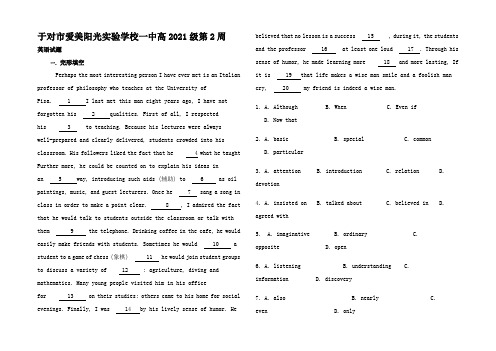
于对市爱美阳光实验学校一中高2021级第2周英语试题一.完形填空Perhaps the most interesting person I have ever met is an Italian professor of philosophy who teaches at the University ofPisa. 1 I last met this man eight years ago, I have not forgotten his 2 qualities. First of all, I respectedhis 3 to teaching. Because his lectures were alwayswell-prepared and clearly delivered, students crowded into his classroom. His followers liked the fact that he 4 what he taught Further more, he could be counted on to explain his ideas inan 5 way, introducing such aids (辅助) to 6 as oil paintings, music, and guest lecturers. Once he 7 sang a song in class in order to make a point clear. 8 , I admired the fact that he would talk to students outside the classroom or talk with them 9 the telephone. Drinking coffee in the cafe, he would easily make friends with students. Sometimes he would 10 a student to a game of chess (象棋) 11 he would join student groups to discuss a variety of 12 : agriculture, diving and mathematics. Many young people visited him in his officefor 13 on their studies; others came to his home for social evenings. Finally, I was 14 by his lively sense of humor. He believed that no lesson is a success 15 , during it, the students and the professor 16 at least one loud 17 . Through his sense of humor, he made learning more 18 and more lasting, If it is 19 that life makes a wise man smile and a foolish man cry, 20 my friend is indeed a wise man.1. A. Although B. When C. Even ifD. Now that2. A. basic B. special C. commonD. particular3. A. attention B. introduction C. relation D. devotion4. A. insisted on B. talked about C. believed in D. agreed with5. A. imaginative B. ordinary C.opposite D. open6. A. listening B. understanding C.information D. discovery7. A. also B. nearly C.even D. only8. A. Later B. Secondly C. However D. Therefore9. A. with B. by C. from D. on10. A. invite B. lead C. prefer D. show11. A. As a matter of fact B. Later on C. Other times D. In general12. A. questions B. subjects C. mattersD. contents13. A. support B. explanation C. experienceD. advice14. A. disturbed B. moved C. attracted D. defeated15. A. for B. until C. since D. unless16. A. hear B. suggest C. shareD. demand17. A. laugh B. cry C. shout D. question18. A. helpful B. enjoyable C. practicalD. useful 19. A. natural B. normal C. hopeful D.true20. A. so B. for C. then D. yet二.阅读理解One evening after dinner, Mr. and Mrs. Tisich called a family meeting. “We’ve had to make a difficult decision,〞 Mr. Tisich announced. “You see, your mother has been offered a post as co-director of a television station in Chicago. Unfortunately, the station is not here. After thinking long and hard about it, we’ve concluded that the right decision is to move to Chicago.〞Marc looked shocked, while his sister Rachel breathlessly started asking when they’d be moving. “It’s surprising, but exciting!〞 she said. Marc simply said, “We can’t go—I can’t leave all my friends. I’d rather stay here and live with Tommy Lyons!〞The Tisichs hoped that by the time they moved in August, Marc would grow more accustomed to the idea of leaving. However, he showed no signs of accepting the news, refusing to pack his belongings.When the morning of the move arrived, Marc was nowhere to be found. His parents called Tommy Lyons’ house, but Mrs. Lyons said she hadn’t seen Marc. Mrs. Tisich became increasingly concerned, while her husband felt angry with their son for behaving so irresponsibly.What they didn’t know was that Marc had started walking over to Tommy’s house, with a faint idea of hiding in Lyons’ attic(阁楼) for a few days. But something happened on the way as Marc walked past all the familiar landscape of the neighborhood: the fence that he and his mother painted, the tree that he and his sister used to climb, the park where he and his father often took evening walks together. How much would these mean without his family, who make them special in the first place? Marc didn’t take the time to answer that question but instead hurried back to his house, wondering if there were any moving cartons(纸板箱)the right size to hold his record collection.21. The conflict in this story was caused by___________.A. Marc and Rachel’s different tempersB. a quarrel between Tommy Lyons and MarcC. Marc’s disagreement with his parents about their moveD. Mr. and Mrs. Tisich’s remark of Marc’s irresponsibility22. Marc and Rachel’s reactions to the move were similar in the way that both were____________A. surprisedB. angry and upsetC. anxious for more detailsD. worried about packing23. The reason for Marc’s going home was that _________________.A. he did not want to be left behindB. he realized his family was essential to himC. he hoped to reach an agreement with his parentsD. he wished to be a more responsible person24. What would most likely happen next?A. Marc would bring his records over to the Lyons’s house.B. Mr. and Mrs. Tisich would call the police.C. Marc would join his family for house moving.D. Mr. and Mrs. Tisich would start searching for Marc.三.改错:One afternoon, when I was on my way home, a sky changed suddenly. Dark clouds were gathered. I began to feel worried because I didn’t have both a raincoat or umbrella about me. It soon started to rain. Just as I was hurrying home, I heard someone call me from behind. I turned to have a look and find that he was Liu Wei, a good neighbour of mine. He offered to share his umbrella with me. We walked all the ways home. With Liu Wei’s help, I would have got wet to the skin. How much thankful I was for his help!2021级英语学科第2周周训练题参考答案:1-5 ABDCA6-10 BCBDA11-15 CBDCD16-20 CABDC21-24 CABC短文改错练习1.a- the2. gathered-gathering3.both-either4. or ^umbrella-an5.call- calling6. find-found7.he-it8.ways-way9.with-without10.much(去掉)。
【试卷】2021届高一(下)英语综合题 周周练第2周及答案
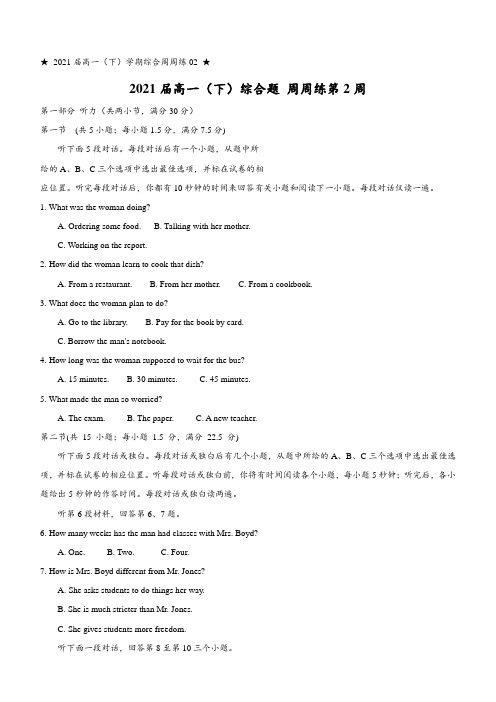
★2021届高一(下)学期综合周周练02 ★2021届高一(下)综合题周周练第2周第一部分听力(共两小节,满分30分)第一节(共5小题;每小题1.5分,满分7.5分)听下面5段对话。
每段对话后有一个小题,从题中所给的A、B、C三个选项中选出最佳选项,并标在试卷的相应位置。
听完每段对话后,你都有10秒钟的时间来回答有关小题和阅读下一小题。
每段对话仅读一遍。
1. What was the woman doing?A. Ordering some food.B. Talking with her mother.C. Working on the report.2. How did the woman learn to cook that dish?A. From a restaurant.B. From her mother.C. From a cookbook.3. What does the woman plan to do?A. Go to the library.B. Pay for the book by card.C. Borrow the man's notebook.4. How long was the woman supposed to wait for the bus?A. 15 minutes.B. 30 minutes.C. 45 minutes.5. What made the man so worried?A. The exam.B. The paper.C. A new teacher.第二节(共15 小题;每小题1.5 分,满分22.5 分)听下面5段对话或独白。
每段对话或独白后有几个小题,从题中所给的A、B、C三个选项中选出最佳选项,并标在试卷的相应位置。
听每段对话或独白前,你将有时间阅读各个小题,每小题5秒钟;听完后,各小题给出5秒钟的作答时间。
每段对话或独白读两遍。
高一下英语周练二
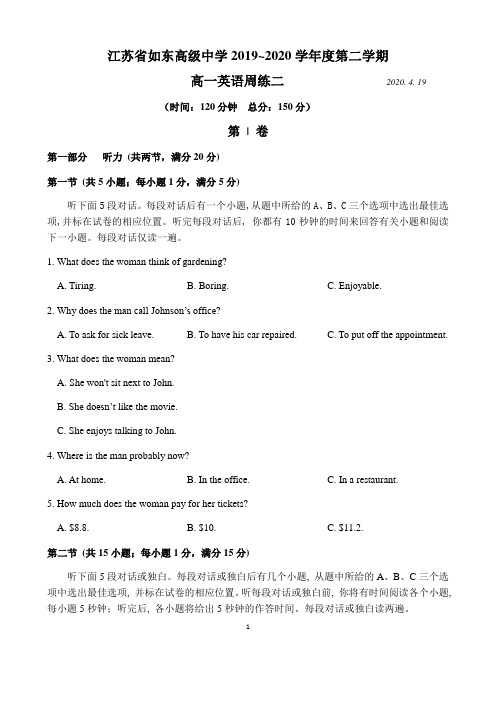
江苏省如东高级中学2019~2020学年度第二学期高一英语周练二2020. 4. 19(时间:120分钟总分:150分)第I卷第一部分听力(共两节,满分20分)第一节(共5小题;每小题1分,满分5分)听下面5段对话。
每段对话后有一个小题,从题中所给的A、B、C三个选项中选出最佳选项,并标在试卷的相应位置。
听完每段对话后, 你都有10秒钟的时间来回答有关小题和阅读下一小题。
每段对话仅读一遍。
1. What does the woman think of gardening?A. Tiring.B. Boring.C. Enjoyable.2. Why does the man call Johnson’s office?A. To ask for sick leave.B. To have his car repaired.C. To put off the appointment.3. What does the woman mean?A. She won't sit next to John.B. She doesn’t like the movie.C. She enjoys talking to John.4. Where is the man probably now?A. At home.B. In the office.C. In a restaurant.5. How much does the woman pay for her tickets?A. $8.8.B. $10.C. $11.2.第二节(共15小题;每小题1分,满分15分)听下面5段对话或独白。
每段对话或独白后有几个小题, 从题中所给的A、B、C三个选项中选出最佳选项, 并标在试卷的相应位置。
听每段对话或独白前, 你将有时间阅读各个小题, 每小题5秒钟;听完后, 各小题将给出5秒钟的作答时间。
每段对话或独白读两遍。
- 1、下载文档前请自行甄别文档内容的完整性,平台不提供额外的编辑、内容补充、找答案等附加服务。
- 2、"仅部分预览"的文档,不可在线预览部分如存在完整性等问题,可反馈申请退款(可完整预览的文档不适用该条件!)。
- 3、如文档侵犯您的权益,请联系客服反馈,我们会尽快为您处理(人工客服工作时间:9:00-18:30)。
横峰中学2014—2015学年度下学期高二英语第二周周练卷考试时间:90分钟总分:125分命题人:朱芝君第一部分:听力(共两节,满分30分)第一节听下面5段对话。
每段对话后有一个小题,从题中所给的A、B、C三个选项中选出最佳选项,并标在试卷的相应位置。
听完每段对话后,你都有10秒钟的时间来回答有关小题和阅读下一小题。
每段对话仅读一遍。
1.What is the man?A. A taxi driver.B. A policeman.C. A restaurant waiter.2.What will the weather be like tomorrow?A. It will be cold B .It will rain. C .It will be windy.3.Where are the two speakers speaking?A. At the railway station.B. On the train.C. On the phone.4.Where is Sue now?A. At home.B. At the hospital.C. At the office.5.What can we learn from the conversation?A. The line is very busy now.B. The man will possibly call againC. The man was cut off.第二节听下面5段对话或独白。
每段对话或独白后有几个小题,从题中所给的A、B、C三个选项中选出最佳选项,并标在试卷的相应位置。
听每段对话或独白前,你将有时间阅读各个小题,每小题5秒钟;听完后,各小题将给出5秒钟的作答时间。
每段对话或独白读两遍。
听第6段材料,回答第6至7题。
6.Why is her son not going to take a vacation?A.Because he doesn’t like traveling.B.Because he is busy with his studies.C.Because he doesn’t like going abroad.7.When are the woman and her husband going to leave for China?A.Next week.B.Next Wednesday.C.Next month.听第7段材料,回答第8至10题。
8.What day of the week is it today?A.Wednesday.B.Thursday.C.Friday9.What is Michael planning to do on Sunday afternoon?A.Go to the football game.B.Go out with some friendsC.Show his sister and her husband around.10.When will Michael go over his lessons for the test?A.On Monday evening.B.On Sunday morning.C.There’s no tim e for him to do so.听第8段材料,回答第11至13题。
11.Where does the conversation take place?A.In a restaurant.B.At the woman’s home.C.In a ballet center.12.Who is the woman with long black hair?A.The woman’s sisterB.The woman’s teacher.C.The man’s friend.13.Why does the man come here?A.To meet Carol.B.To attend the party.C.To practice ballet.听第9段材料,回答第14至17题。
14.Why are they discussing the apartment?A.Because the woman wants to advertise it.B.Because the man is considering renting it.C.Because the man is considering buying it.15.What do we know about the two bedroom apartment?A.It has been sold out.B.It has no heating.C.It has plenty of light16.What does the woman say about parking?A.Parking is free for the man.B.Parking is cheap for the man.C.It’s hard to find a parking place.17.What does the man think of the apartment?A.He thinks it is very cheap.B.He is uninterested in the apartment.C.He doubts if he can afford it听第10段材料,回答第18至20题。
18.Where did Gloria work as a waitress?A.At a bar in New York.B.At Top Club of Britain.C.At a club in the United States.19.Why did Top Club pay Gloria the money?A.Because Gloria worked hard for the club.B.Because Gordon had no money in the bankC.Because her story made the club well known.20.What is this story mainly about?A.A lost and found check.B.An unexpected sum of money.C.The biggest tip in the history.第二部分:阅读理解(共两节,满分40分)第一节(共15小题;每小题2分,满分30分)APersonal computers and the Internet give people new choices about how to spend their time.Some may use this freedom to share less time with certain friends or family members, but new technology will also let them stay in closer touch with those they care most about. I know this from personal experience.E-mail makes it easy to work at home, which is where I now spend most weekends and evenings. My working hours aren’t necessarily much shorter than they once were but I spend fewer of them at the office. This lets me share more time with my young daughter than I might have if she’d been born before electronic mail became such a practical tool.The Internet also makes it easy to share thoughts with a group of friends. Say you do something fun — see a great movie perhaps — and there are four or five friends who might want to hear about it. If you call each one, you may tire of telling the story.With E-mail, you just write one note about your experience, at your convenience, and address it to all the friends you think might be interested. They can read your message when they have time, and read only as much as they want to. They can reply at their convenience, and you can read what they have to say at your convenience.E-mail is also an inexpensive way to stay in close touch with people who live far away. More than a few parents use E-mail to keep in touch, even daily touch, with their children off at college.We just have to keep in mind that computers and the Internet offer another way of staying in touch. They don’t eliminate(排除) any of the old ways.21. The purpose of this passage is to _______.A. explain how to use the InternetB. describe the writer’s joy of keeping up with the latest technologyC. tell the merits (价值) and usefulness of the InternetD. introduce the reader to basic knowledge about personal computers and the Internet22. The use of E-mail has made it possible for the writer to ______.A. spend less time workingB. have more free time with his childC. work at home on weekendsD. work at a speed comfortable to him23. According to the writer, E-mail has an obvious advantage over the telephone because the former helps one _______.A. reach a group of people at one time convenientlyB. keep one’s communication as personal as possibleC. pass on much more information than the laterD. get in touch wi th one’s friends faster than the later24. The best title for this passage is _______.A. Computer: New Technological AdvancesB. Internet: New Tool to Maintain Good FriendshipC. Computers Have Made Life EasierD. Internet: a Convenient Tool for CommunicationBA vulture(秃鹫) is in need of help. Can it be saved?A big bird is in danger. The bird is the California condor(神鹰), a vulture. A vulture is a large bird that eats the dead animals it finds.The condor is nearly as big and fast as a small airplane. But you may never see it in the sky. Not enough young birds are hatching to take the place of the old birds that die. When an animal dies out completely, or disappears from the earth, it is extinct.The condor is in danger of extinction for many reasons. People have built cities where the condors used to live. The condors are having trouble finding food. The birds sometimes get sick. When they do, they cannot hatch young birds.Some people would like to help the condor. They have captured the 26 condors still on Earth. The condors were taken to two zoos in California. In the zoos, they can live safely and hatch young birds. When there are 200 condors they will be moved to a safe new home in the mountains.25. An animal is extinct if it _______.A. feeds on dead animalsB. has disappeared from the earthC. has human friends to save itD. eats wild plants26. According to the story, vultures eat_______.A. eggs and grassB. only live animalsC. dead animals they findD. the sea animals27. The condor is nearly as big and fast as a small _______.A. airplaneB. tractorC. bikeD. bus28. The biggest danger to condors comes from _______.A. wild animalsB. other birdsC. peopleD. dead animalsCLast week, we published an article about modern marriage. A recent research showed that in England 51% of married women go out to work. People were asked what they thought ofWe asked readers to write and tell us their opinions. Here are some of the hundreds of letters we got.Ms Joji O’leary—I’m a woman photographer. I make plenty of money, travel a lot, and see a lot of people. I enjoy my work, and wo uldn’t have to stay at home. I would never marry a man who wanted me to give up my work.Ted Stubbs—At present there are over 1, 000, 000 men who were out of work in Britain. If a woman gets a job, she puts one more man out of work. Perhaps that man has a wife and twelvechildren to support. Let women stay at home as they used to.Mrs. F. Boot Battersea —I am the mother of twelve children. When I go to work, my husband looks after the children. He is good with children and enjoys staying at home with them. And I enjoy job as a bus driver.29. _______ of men are on the side of working wives.A. MostB. NoneC. 100%D. A few30. The woman photographer would not marry a man who_______.A. had less money than herB. forbade her to workC. was not very gentleD. wanted to stay at home31 Ted Stubbs thought that woman going out to work would _______.A. weaken the rights of the husband at homeB. be better than menC. make men lose chances for workD. make their husbands useless32. In England, 51%_______.A. of working women are marriedB. of the women who have been married go out of workC. of the married women want to go to workD. of the people are in favour of married women’s going out to workDFilm stars may come and go, but Pa ul Newman’s career(事业) is long-lasting. Newman has worked in films for 40 years. His most recent one opened in December.The film is called “Nobody’s Fool”. Newman plays a 60-year-old construction worker named Sully. To some people, Sully seems to be a loser. But he has a lot of charm(魅力). His life changes when his son comes to town. Late in life, Sully learns to grow up.“I’ve played a lot of characters and the character I play in 'Nobody’s Fool’ is closer to me than any other role I’ve done,” says N ewman.Newman turned 70 years old on January 26, 1998. “Nobody’s Fool” is his 52nd film. He has won two Oscars in his career.Newman has found success in other aspects(方面) of life. He has been married for 36 years. He took up car racing at the age of 47 and won prizes.Twelve years ago, he started a food company called Newman’s Own. He gives away all his money helping the poor.33. The underlined sentence implies _______.A. many film stars leave the screen after they’ve become successfulB. It is not easy for a film star to lose his or her charmC. not all film stars can remain famous for a long timeD. film stars are successful not only on the screen34. Newman likes the character of Sully because _______.A. he finds a lot in the character that is new to himB. he likes playing an ordinary personC. he has never played such a wonderful roleD. he sees more of himself in Sully35. Newman was born in the _______.A. 1920sB. 1930sC. 1940sD. 1950s第二节(共5小题;每小题2分,满分10分)根据短文内容,从短文后的选项中选出能填入空白处的最佳选项。
